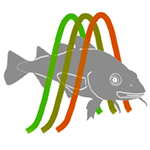ECOKNOWS
 |
Effective use of ecosystem and biological knowledge in fisheries |
|
Research
Context and Issues
The lack of appropriate methods and fear of statistical overparameterisation has limited biological and ecological reality in models for fisheries ecology and fish stock assessment. This reduces the biological credibility of models to many stakeholders.
Objectives
The overall aim of the ECOKNOWS project is to develop a computational learning approach that builds on extensive existing biological and environmental databases, published papers and survey data sets to improve integration of biological processes and multiple data sources in fisheries stock assessment models. The methodological approach will summarise current knowledge on stock assessment and enable risk estimates for management actions.
Our research group will develop models applied to the dynamics of Atlantic salmon metapopulations at the scale of the Northern Atlantic and provide insights to the influence of large scale ecosystem changes on Atlantic salmon populations.
Research developed in close collaboration with the ICES Working Group on North Atlantic Salmon will also improve methods for assessing salmon stocks.
Methodology
Bayesian statistics and modern computational algorithms of artificial intelligence will form the methodological backbone of the ECOKNOWS project.
To extend the use of the Bayesian methodology to fisheries sciences, we will develop a Bayesian Integrated Life Cycle Model for Atlantic salmon to improve the integration of the knowledge on the biological process and of multiple sources of data available on this species.
Results
Ongoing results:
- The model increases understanding of Atlantic salmon population ecology. The multi-scale approach allows researchers to separate out the influence of environmental factors acting at different spatial scales and to identify the influence of large-scale ecosystem changes that impact all populations during the marine phase of the life cycle.
- The approach also improves assessment and management of Atlantic salmon stocks. The impact of marine fisheries on returns of adults can be assessed in a probabilistic approach that accounts for all sources of uncertainty.
Publications issued from the project
ROMAKKANIEMI, A. APOSTOLIDIS, C. BAL, G. FROESE, R. KOPRA, J. KUIKKA, S. LEACH, P. LEVONTIN, P. MANTYNIEMI, S. O MAOILEIDIGH, N. MUNFORD, J. PULKKINEN, H. SONI, V. RIVOT, E. STERGIOU, K WHITE, J. WHITLOCK, R. (2015) .Best practices for the provision of prior information for Bayesian stock assessment
People involved
 |
RIVOT Etienne, Scientist Phone : +33 2 23 48 59 34 Email : etienne.rivot@institut-agro.fr |
Partners
Finnish Game and Fisheries Research Institute, Finland
Marine Institute, Ireland
Imperial College London, UK
Swedish Board of Fisheries, Sweden
Institut National de la Recherche Agronomique, France
Agrocampus Ouest, France
Department of Fisheries and Oceans, Canada
Instituto Español de Oceanografia, Spain
Consejo Superior de Investigaciones Cientificas, Spain
Aristotle University, Greece
ICES International Council for the Exploration of the Sea
FishBase Information and Research Group, Inc.
Funding and Support
Europe, 7th European Framework Program
